Opening up: A short tour through Albanian theatre
On a packed programme of theatre in Tirana at the Kosovo/Albania Theatre Showcase.
Apologies, this week’s newsletter is a little late going out because of, well, everything.
I just got back from Tirana, where I was running a workshop on criticism with young writers from Albania and the wider region as part of the Kosovo/Albania Theatre Showcase. It was a packed programme - five days of shows, panels and workshops – but it was also illuminating, and I especially enjoyed hearing the thoughts of the young critics on the work we were watching.
While I was in Tirana, my big profile of Forced Entertainment was published in The Stage. To mark the company’s 40th anniversary I spoke to Tim Etchells and fellow company members about artistic longevity and how international coproduction keeps them afloat. I also spoke to Yves Degryse, co-artistic director at NTGent, about their new resident artist, Alva Ishii, who is the product of AI. Is this a smart way of looking the future in the face or a questionable road for an arts organisation to go down? I thought it was only fair to ask Alva how she feels about this debate too.
Café Europa is free to read, and I’d like it to stay that way, but it takes time to research and write. If you find it valuable and would like to help support my writing, please consider becoming a paid subscriber or you can share it with others who might like it. That’s also enormously helpful.
“Theatre remains a museum in Albania,” explains Gjergj Prevazi, artistic director of Tirana’s National Experimental Theatre. This Kosovo/Albania showcase, the first such event to be held in the country, was an attempt to open the doors.
For a long time, the Albanian theatre scene has been cut off from the developments of theatre in Europe. Under Enver Hoxha, Albania endured one of the most repressive communist regimes in Eastern Europe. During this time, the theatre that was produced had a heavy Soviet influence, while Western culture was considered bourgeois and decadent. Today, over thirty years after the collapse of the communist regime, Albanian theatre remains comparatively isolated and rarely tours festivals beyond other Albanian speaking countries
Since 2018, Qendra Multimedia has presented an annual theatre showcase in Pristina in Kosovo. While the primary aim of the showcase has been to present Kosovar work to an international audience, the programme often features Albanian work. This year the decision was made to relocate the showcase to Tirana and expand it to join forces with Albanian theatres. This reasons for this were two-pronged. The National Theatre in Kosovo is still under renovation and currently homed in a temporary space, and the Oda Theatre, one of only three permanent theatres in Prishtina, is also about to be renovated. So, the lack of available space informed the decision, but there was also a political objective, a desire to platform Albanian work, to contextualise it and to forge international connections.
The showcase featured 10 performances over five days as well as various talks and a playwriting workshop led by UK playwright Mark Ravenhill which focused on dramatizing the post-communist experience. The bulk of the programme was presented in ArTurbina, formerly a hydro turbine during the communist period. Along with the National Experimental Theatre, the building is also the temporary home to the National Theatre of Albania, following the demolition of its original building in May 2020.
Despite a sustained campaign over several years by artists and activists to keep the original 1930s building, armed police showed up in the middle of the night to knock it down. The demolition took place at 4.30 am and started while several people were still in the building. (Here is a super-detailed SEEstage piece about the theatre’s history, its demolition and those who fought to save it). The government had initially announced that a new theatre would be built in the same place, but it was later discovered the land was to be sold to private investors. During the showcase, some of the international guests - including the German critic Tom Mustroph, whose piece on the showcase you can read here - were treated to a speech by the Mayor of Tirana, Erion Veliaj, about the plans for the new national theatre, but according to several of the young critics in the workshop I was running, this was a piece of theatre in itself.
A sense of frustration about the state’s general lack of interest in the arts permeated the showcase, with complaints of funding drying up and projects stalling. Altin Basha, artistic director of the National Theatre, summarised this succinctly in one of the panels: “The state fucked up.”
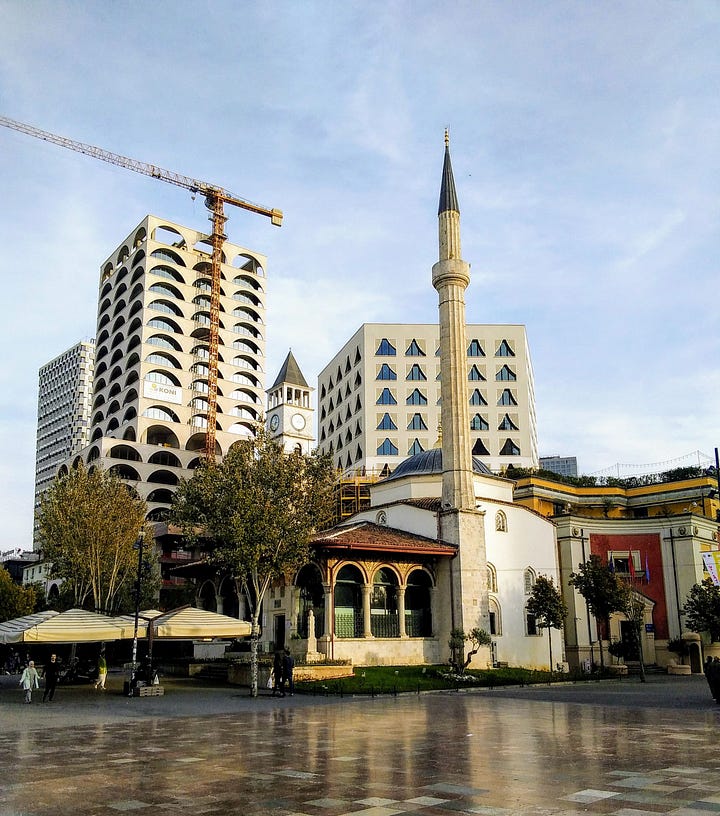
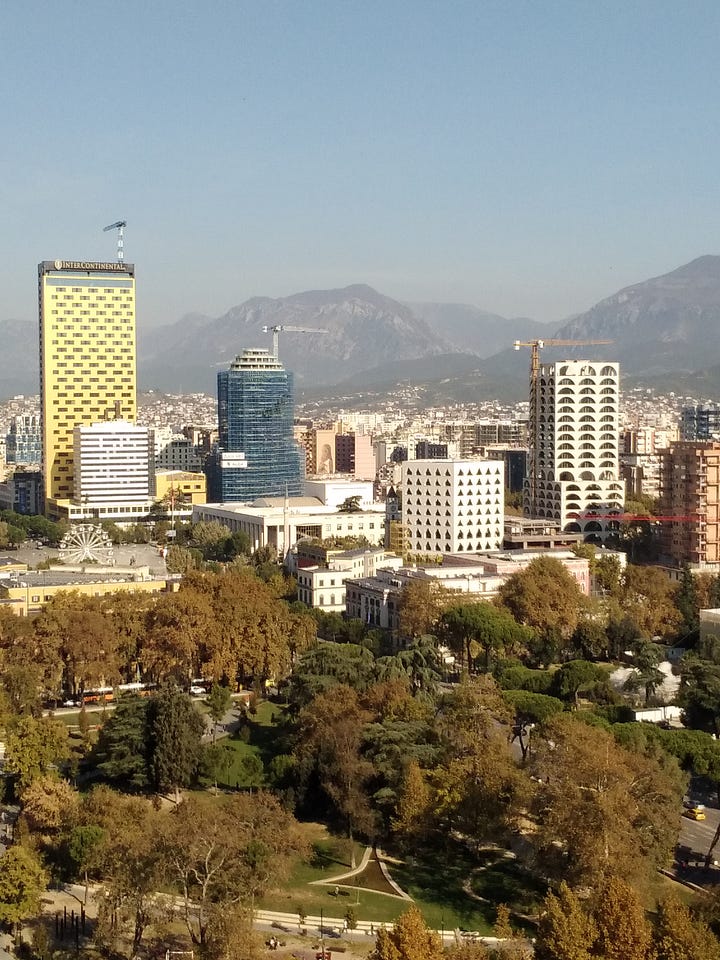
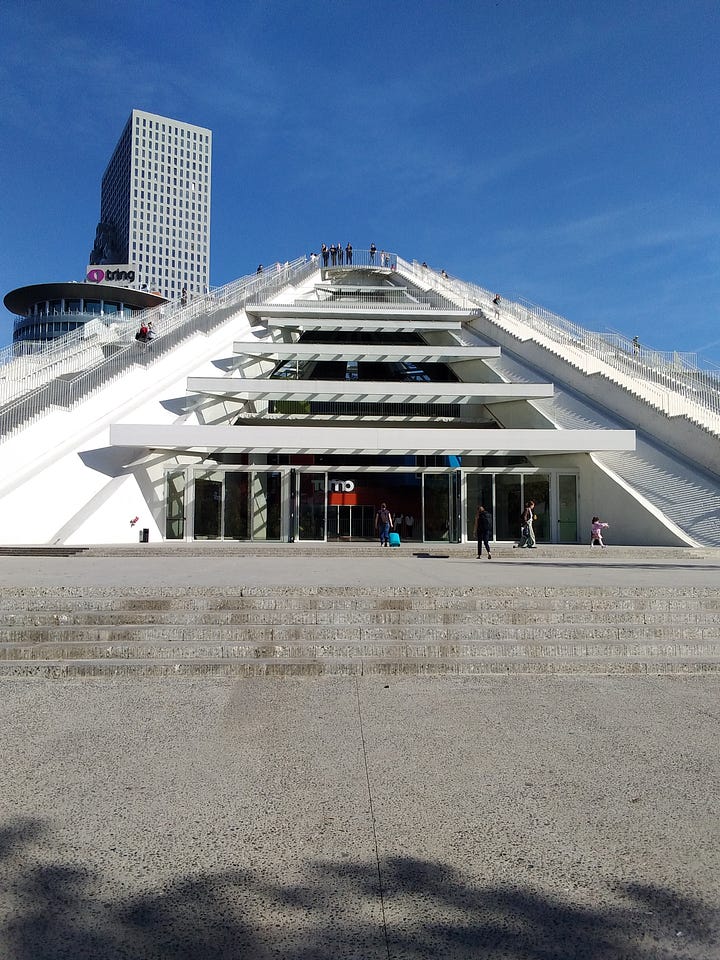
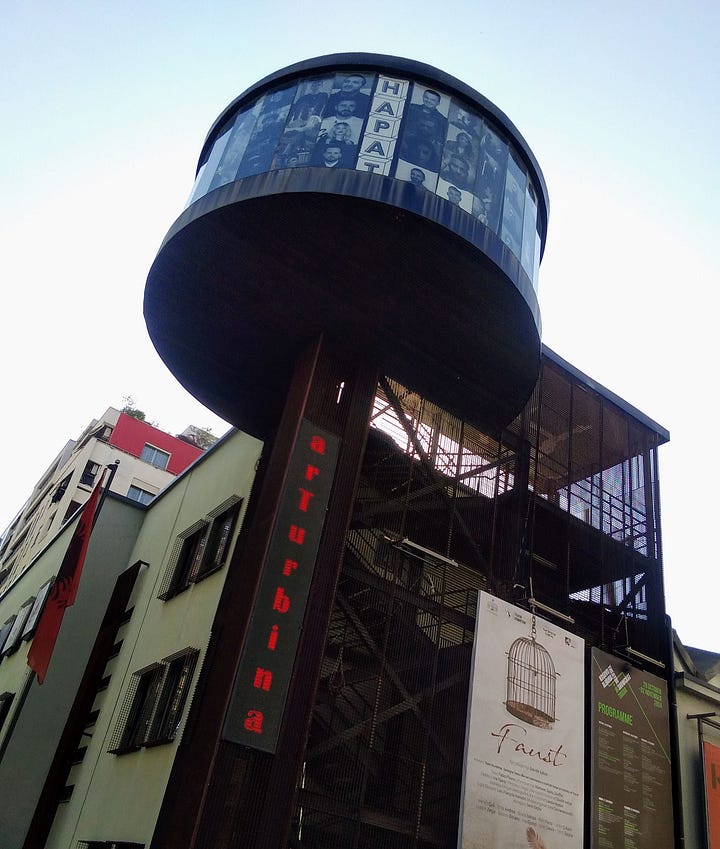
Documenting the past
A real effort had been made to present us with a spectrum of work, from city theatres outside the capital and the independent scene, including Sajza Flower, the showcase’s opening show. Director Endri Çela has used documentary techniques to tell the story of Tepelena, the notorious internment camp which operated between 1949 to 1954, and in which the families of those deemed to have transgressed against the state, were held in appalling conditions. (You can read more about it, and the campaign to turn the camp into a museum, here). Scarcity of food and prevalence of disease led to many deaths, and the rate of infant mortality was particularly high with parents sometimes required to dig their own children’s graves. (And sometimes, horrifically, to disinter them and move the bodies elsewhere).
The stage floor is covered with earth and barbed wire erected between the audience and performers (though some audience sit on the stage, inside the ‘camp’). Çela presents this incredibly grim story via a mixture of documentary video material and testimony read by two actors interspersed with poetry and song. As the two female performers speak, a young woman – dancer Valentina Myteveli – rises from the earth, embodying the spirit of a child who died in the camp. She performs a series of movements and expressive gestures, sometimes playful, sometimes more stylised, her physicality contrasting with the stillness of the speakers. Were it not for her, it would be a very static performance.
I’m given to understand that documentary theatre is not that common in Albania and while the techniques here were simple, the power of the piece was considerable. While many attempts have been made to bring to the surface things that were once hidden – the headquarters of the secret police is now a chilling museum, the House of Leaves - the extent of the inhumane treatment in the camps, the cruelty meted out to children, remained shocking to everyone in the audience. The presence of one of the survivors of the camp, now an elderly man, who rises from the among the audience to tell his own story, only adds to the piece’s power. In the absence of a museum, this performance fulfilled that role.
Sombre and slow-paced as it was, the piece was the tonal opposite of the National Theatre’s production of Faust, which premiered that same evening. The show was directed by the Italian Davide Iodice, one of two pieces directed by Italian directors in the showcase. (There are strong historical and cultural ties between Albania and Italy - something the Meloni government is now attempting to exploit with its proposals to ‘offshore’ migrants to Albania). Despite a vigorous and impish performance by Ema Andrea (also a producer of independent work in Albania) as Mephistopheles, the whole thing was emotionally remote. There was a lot of stuff going on, including a football-scarf sporting, manically cackling God and much business with mirrors, but it often felt like a production going through the motions.
The same could not be said of Six Against Turkey, the new play by Kosovar playwright Jeton Neziraj, was the source of enraged editorials in pro-government Turkish newspapers before it had even opened. The play is inspired by the 2018 deportation from Kosovo of six Turkish men accused of being supporters of the cleric Fethullah Gulen, in the aftermath of the 2016 coup, the blame for which Erdogan laid on Gulen and his followers. (This Balkan Insight piece gives a thorough account of what prompted Neziraj to write the text and what the consequences have been so far).
A call-out was made earlier in the year for Turkish actors to participate in the project, but as soon as they found out the nature of the play many became wary. Both actors who initially agreed to perform in the play withdrew early in the rehearsal process, something they explain within the performance. Even though one of the actors was based in Berlin, the risk was too great. Police were on standby during the premiere and the Turkish authorities have clearly been keeping an eye on the show, with footage filmed in the audience soon finding its way online.
The production interlaces Turkish shadow puppetry, onstage candy floss-making, beach inflatables and meta-theatrical jokes. Personally I found the story of the six deportees got a bit lost amid all the other many things the play was trying to do and say, but it is a production of immense energy and an undoubtedly brave undertaking.
The Traitor’s Niche is a dramatization of a 1978 novel by Ismal Kadare that was banned under Enver Hoxha’s regime. Set at the tail-end of the Ottoman Empire, the text has been adapted by playwright Doruntina Basha and directed by Kushtrim Koliqi for the National Theatre of Kosovo. The novel takes its title from the stone niche in which the sultan liked to display the severed heads of his enemies and it explains how the head of Ali Pasha Tepelena found its way there following an unsuccessful rebellion. The narrative charts the fortunes of several men, including the cruel but weak Sultan, the courier whose job it is to transport the severed heads to the capital and Abdulla, one of the guards of the niche (played with sweaty intensity by Adrian Morina) who becomes unhealthily sexually fixated on the heads.
Basha’s adaptation is clearly interested in the psychological impact that a brutal system has on those who live within it, as well as the way in which men in positions of power sculpt their public image, then as now, however the tonal mix of Koliqui’s production was often whiplash-inducing, swerving from horror - heads get tossed about like basketballs and blood gets liked from fingers - to over-the-top comedy, with Ylber Bardhi’s child-like Sultan giving off major Joffrey-from-Game-of-Thrones vibes. Super Mario-esque 8-bit style video projections of heads being lopped from bodies amplified the idea that, to the Sultan at least, this was a kind of bloody game. Traditional costumes are augmented by roller skates, while Bekim Korça’s scenography consists of a giant tambourine, which sometimes lights up like a dance floor in Saturday Night Fever. As the elderly Ali Pasha, Bislim Muçaj gives the play’s most measured and reflective performance, providing a welcome breather from the often-frantic production.
The Kosovar strand of the programme also included White People, an adaption of a play by US playwright and critic Steven Leigh Morris. Originally titled Lear in Tulsa, it has been condensed and adapted by Besim Ugzmajli. Morris’ text explores current sensitivities around race and gender as they manifest in America – and American theatre. In the original, Lewis, an aging white artistic director at a theatre in Tulsa, Oklahoma clashes with a Black British female director over the casting of a production of King Lear in which he is to star, over her casting of a white actor to play the role of Cordelia, while Black actors play Goneril and Regan. Could this decision be interpreted as racist? She he re-cast the role? This causes all kind of handwringing about unconscious bias, wider questions of representation and ‘wokeness’.
This is a play that wrestles with a whole host of issues: shifting generational sensitivities, what is unhelpfully labelled cancel culture, and Tulsa’s supremacist past (and, also, present). I must admit I struggled with the stylistic clash between the dialogue-driven, distinctly American mode of writing and the more heightened approach to performance. However, it is worth saying that most of the critics in my group did not have this issue at all and it posed no barrier to them in engaging with the themes of the play.
In adapting the play for a regional audience, the key arguments remain but the character of the Black woman has been excised from the text, becoming an offstage antagonist instead. While I appreciate the reasons behind this decision, this absence is never fully interrogated within the production. Instead, it attempts to draw a line between the issues it is discussing and the local context by including a section in which the performers step out of character to discuss an incident in 2008 when a Roma director, Rahim Burhan, was invited by the National Theatre of Kosovo to stage Moliere's Tartuffe, resulting in a backlash. 2008 was the year of Kosovo’s independence, and questions of identity were very much at the forefront of people’s minds. The actors speculate whether or not that would still be the case now, though some are more convinced than others that anything has changed.
I must admit my first response when they got to this part of the performance was to think: well, I’d love to see a play about that, but in having this response am I guess I also mentally policing what stories get told and by whom.
Up-close and personal
The showcase’s lone Serbian production, by the company Heartefact - who regularly bring work to Kosovo and have a long running performance of Doruntina Basha’s play The Finger in their repertoire - was a hyper-intimate production of Paula Vogel’s How I Learned to Drive by the Serbian director Tara Manić. This account of a teenage girl’s grooming and abuse by her uncle was played in extreme close-up with the audience arranged in four banks of seating, facing each other with hardly any space between us, and the two performers, Svetozar Cvetković, something of a legend in Serbia, and Marta Bogosavljević, sitting among us. In the claustrophobic setting in the back room of the hip Tulla Cultural Centre, the audience become the chorus, and also by extension the patriarchal society in which such abuse is able to take place, with Cvetković and Bogosavljević missing no opportunity to look us in the eye and heighten the discomfort of the situation.
Cvetković is a performer of considerable charisma, and he nails the character’s mix of charm, pathos and self-deception, simultaneously compelling and repellent, while Bogosavljević convincingly shifts from pre-teen mode to someone coming to terms with the fact that this formative relationship was abusive. The nature of the seating means you get to appreciate the performers’ every glance and sigh, not to mention the occasional glimmer of tears in Cvetković’s eyes. Together they milk the text for all its icky undertones and and aside from the moment when Cvetković catches a strand of Bogosavljević’s hair between his fingers, the actors only touch once, hugging each other with such depth and tenderness that it feels intrusive to be watching it. I was sitting right behind them and the emotion in the air was so thick you could almost sink your fingers into it.
The showcase programme was ultimately one of contrasts. While Kosovo theatre was itself isolated during the repressive 1990s in Yugoslavia where Albanians were driven out of public institutions, it is clearly in a different place to Albanian theatre. (Serbian theatre is in a different place entirely, though this magnificently intimate production is hardly typical of the scene there either). In some of the pieces we saw, it was definitely possible to perceive the museum-like qualities that Prevazi described. Much of it was traditional in terms of staging and acting style, but in some of the work there was more of a sense of exploration, an openness to new ways of doing things - the showcase being a key example of that.
This week in European theatre
A round-up of festivals, premieres and other upcoming events over the next seven days.
The Manhattan Project - Stefan Bachmann's first production as Burgtheater artistic director is a staging of the new play by The Lehman Trilogy writer Stefano Massini about Robert Oppenheimer and the team of scientists tasked with developing nuclear fission for the US military. It premieres in Vienna on 7th November.
Writers’ Room - Director Sebastian Nübling, musician Jackie Poloni, author Lucien Haug and a company of young performers from Basel have been working together on a performance about working together and what it means to collaborate. Exploring the creative process, it opens at Junges Theater Basel in Switzerland on 12th November
Voila! Theatre Festival – The international festival of work by emerging artists has grown in scale and scope for its 2024 edition. Performed at venues across London and featuring work from countries including Cyprus, Portugal, Poland, Greece and Germany with many of the shows exploring immigrant and mixed heritage identities, the festival opened on 4th November and runs until 24th.

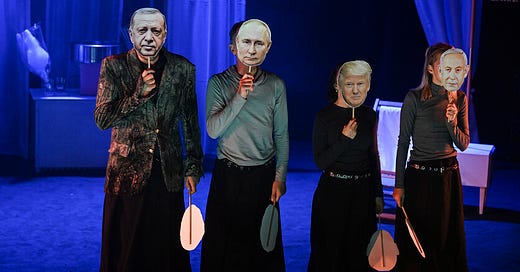



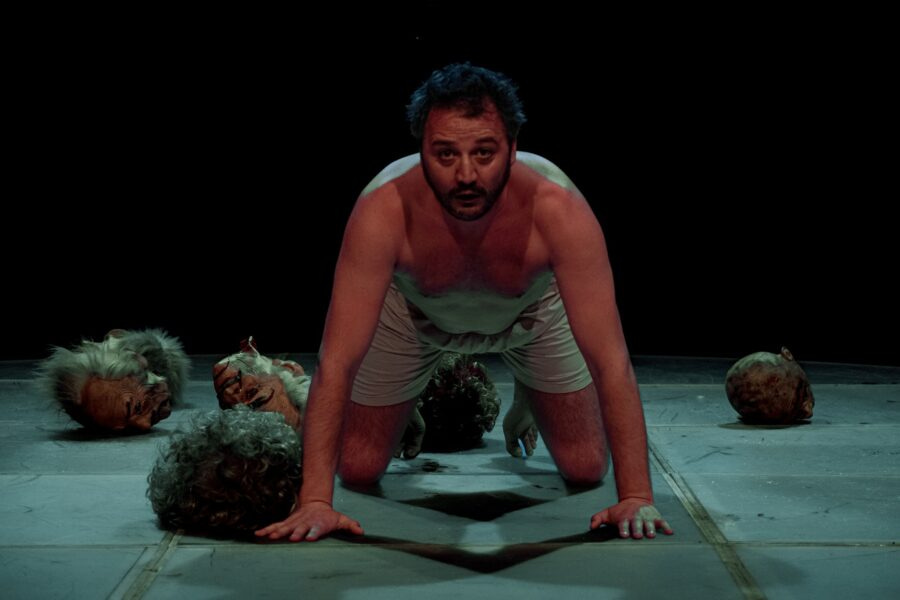

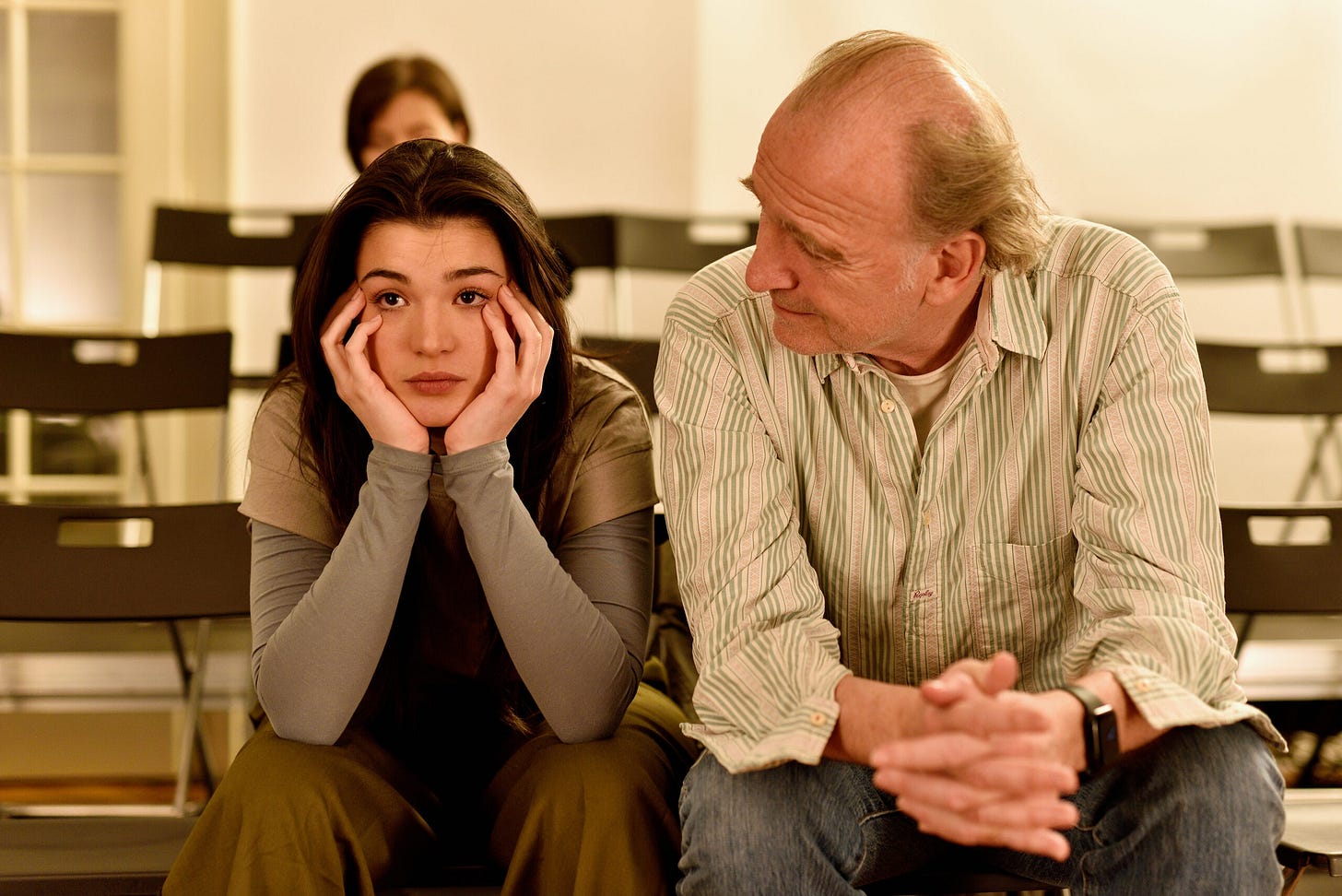
The US is a divided place right now. Which is why it was so good to read this article. It's a great piece and I believe we may come to see more of this type of theatre in our country as MAGA chips away at the arts. It makes me want to pack my bags and head to festivals in Europe. I want to see "How I Learned to Drive" with the two actors up close., and all the others. Question: can you point me towards any resources or articles about the underground theatre movement, (Kantor etc) in Poland etc during WWII? Hope you are well and take care.